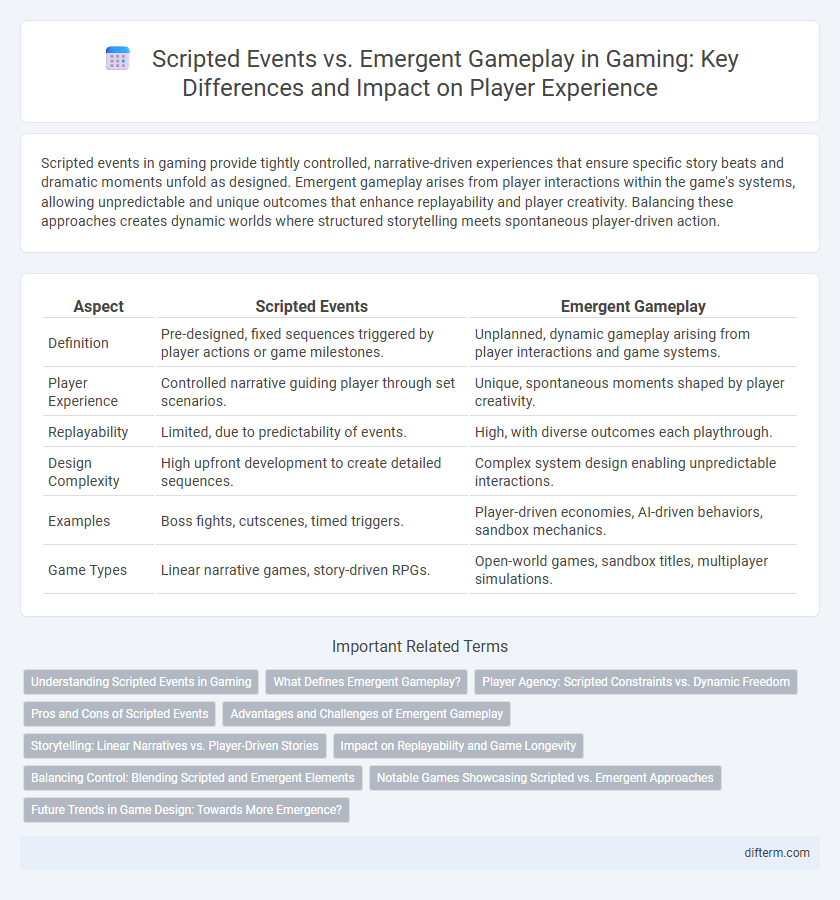Scripted events in gaming provide tightly controlled, narrative-driven experiences that ensure specific story beats and dramatic moments unfold as designed. Emergent gameplay arises from player interactions within the game's systems, allowing unpredictable and unique outcomes that enhance replayability and player creativity. Balancing these approaches creates dynamic worlds where structured storytelling meets spontaneous player-driven action.
Table of Comparison
| Aspect | Scripted Events | Emergent Gameplay |
|---|---|---|
| Definition | Pre-designed, fixed sequences triggered by player actions or game milestones. | Unplanned, dynamic gameplay arising from player interactions and game systems. |
| Player Experience | Controlled narrative guiding player through set scenarios. | Unique, spontaneous moments shaped by player creativity. |
| Replayability | Limited, due to predictability of events. | High, with diverse outcomes each playthrough. |
| Design Complexity | High upfront development to create detailed sequences. | Complex system design enabling unpredictable interactions. |
| Examples | Boss fights, cutscenes, timed triggers. | Player-driven economies, AI-driven behaviors, sandbox mechanics. |
| Game Types | Linear narrative games, story-driven RPGs. | Open-world games, sandbox titles, multiplayer simulations. |
Understanding Scripted Events in Gaming
Scripted events in gaming are pre-determined sequences designed by developers to guide the player's experience and advance the narrative. These events often feature precise timing, specific triggers, and choreographed actions, ensuring a controlled and impactful moment within the game. Understanding scripted events helps players appreciate the structured storytelling elements that contrast with the unpredictability of emergent gameplay.
What Defines Emergent Gameplay?
Emergent gameplay is defined by player-driven interactions and creative problem-solving within the game's systems, resulting in unpredictable and unique experiences that go beyond scripted events. It arises when game mechanics combine dynamically, enabling players to create novel strategies and narratives without pre-designed triggers. This contrasts with scripted events, which are predefined sequences controlled by developers to deliver specific outcomes.
Player Agency: Scripted Constraints vs. Dynamic Freedom
Scripted events in gaming provide structured narratives that guide player actions, ensuring a cohesive story and defined outcomes. Emergent gameplay offers dynamic freedom, allowing players to interact with game systems creatively, leading to unpredictable and personalized experiences. Balancing scripted constraints with player agency enhances immersion by blending narrative control with open-ended exploration.
Pros and Cons of Scripted Events
Scripted events offer developers precise control over narrative delivery and player experience, ensuring key plot points unfold consistently across playthroughs. They enable the creation of cinematic moments and tightly paced gameplay sequences that enhance storytelling immersion. However, scripted events can limit player agency and reduce replayability by restricting unforeseen interactions and dynamic outcomes found in emergent gameplay.
Advantages and Challenges of Emergent Gameplay
Emergent gameplay offers players dynamic, unpredictable experiences by allowing interactions within game systems to produce unique outcomes, enhancing replayability and player creativity. Its advantages include fostering player agency and promoting innovative problem-solving, while challenges lie in balancing game mechanics to prevent chaotic or unmanageable scenarios. Developers must carefully design systemic complexity to support meaningful emergent behaviors without compromising overall game stability and progression.
Storytelling: Linear Narratives vs. Player-Driven Stories
Scripted events in gaming offer tightly controlled storytelling with linear narratives that guide players through predetermined plot points, ensuring a cohesive and cinematic experience. Emergent gameplay emphasizes player-driven stories that evolve organically based on player choices and interactions, resulting in unique and personalized narratives. Balancing scripted events and emergent gameplay enhances storytelling by combining structured plot development with dynamic player agency.
Impact on Replayability and Game Longevity
Scripted events create memorable, curated moments but often limit replayability due to their fixed nature, resulting in predictable gameplay experiences. Emergent gameplay, driven by player interactions and dynamic systems, enhances longevity by offering unique outcomes and varied challenges with each playthrough. Games like "The Legend of Zelda: Breath of the Wild" showcase how emergent mechanics fuel continuous engagement, contrasting with linear, scripted titles that may quickly lose player interest.
Balancing Control: Blending Scripted and Emergent Elements
Balancing control in gaming requires blending scripted events with emergent gameplay to create immersive and dynamic player experiences. Scripted events provide narrative structure and key moments, while emergent gameplay offers unexpected interactions driven by player choices and game mechanics. Incorporating both elements enhances replayability and ensures a balance between guided storytelling and player-driven freedom.
Notable Games Showcasing Scripted vs. Emergent Approaches
Notable games like "The Last of Us" highlight scripted events with meticulously crafted narratives and set-piece moments, delivering a tightly controlled player experience. In contrast, "Minecraft" exemplifies emergent gameplay by offering an open world where player-driven creativity and unscripted interactions create spontaneous scenarios. Titles such as "Red Dead Redemption 2" blend both approaches, integrating scripted story missions with dynamic wildlife and NPC behaviors to enhance immersion.
Future Trends in Game Design: Towards More Emergence?
Future trends in game design emphasize a shift from traditionally linear, scripted events toward more emergent gameplay experiences that allow player-driven narratives and dynamic world interactions. Advanced AI algorithms and procedural content generation are enabling developers to create adaptive environments that respond uniquely to each player's choices, fostering unpredictable and personalized gameplay. This evolution enhances replayability and immersion by blending structured scenarios with spontaneous, player-initiated events, shaping the future of interactive storytelling.
scripted events vs emergent gameplay Infographic

 difterm.com
difterm.com